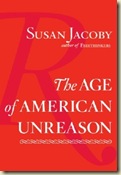The Age of American Unreason: Review Part 1
[Ed. Note: As I might have known, I could not stop reading after a single chapter, so the review and reflection on the first six chapters will each be written after having read them as a block.]
 In the opening chapter of The Age of American Unreason, Jacoby establishes what she contends are the two main causes of the metastatic unreason she finds in America. Titled "The Way We Live Now: Just Us Folks," the opening chapter paints with broad brushstrokes, covering [in some cases quite clumsily] linguistics, the mass media (she attacks television with particular gusto), and fundamentalist religion. In short, the pillars (or post-hole diggers) of American anti-intellectualism are defined precisely where one would expect them to be.
In the opening chapter of The Age of American Unreason, Jacoby establishes what she contends are the two main causes of the metastatic unreason she finds in America. Titled "The Way We Live Now: Just Us Folks," the opening chapter paints with broad brushstrokes, covering [in some cases quite clumsily] linguistics, the mass media (she attacks television with particular gusto), and fundamentalist religion. In short, the pillars (or post-hole diggers) of American anti-intellectualism are defined precisely where one would expect them to be.
Problematically, Jacoby spends little time promoting intellectualism (granted, this is not the mission of the book); however, Jacoby's argument for rationalism and scientific method are seriously undermined by treating "intellectualism" and "rationality" as things which are inherently good, as though they themselves are devoid of rhetoric, non-ideological, and natural.1
Jacoby, however, would disagree. At every turn Jacoby posits that intellectuals are the accurate interpreters of "culture"—using it not in Raymond Williams' tripartite sense, which includes the whole way of life for a people, but in Matthew Arnold's sense of culture as,
the great help out of our present difficulties; culture being a pursuit of our total perfection by means of getting to know, on all matters which most concern us, the best which has been thought and said in the world.... (Culture and Anarchy)
By subscribing to such an ideology, Jacoby feels no need to justify the denigration of television because she contends it disrupts reading, a highly-valued cultural practice.
Jacoby opens with an analysis of the rhetorical usage of "folks," particularly how President George W. Bush has consistently used the term in his political addresses. While Jacoby's analysis of the rhetorical effect of that term is accurate—by being repeatedly called one of the folks, one subjectifies (not her term) him- or herself as one of the good ol' boys or girls who has no need for intellectualism—she reveals herself to be a linguistic prescriptivist, arguing for an inflexible language and lamenting the supposed "debased speech" as a sign of cultural degeneracy.
Paradoxically, Jacoby argues that language and meaning does change when she defines debased speech not as, "the prevalence of obscene language, so widespread as to be deprived of force and meaning at those rare times when only an epithet will do" (7). By arguing that language can lose its efficacy, Jacoby is arguing for a descriptivist approach to language, one that is based upon actual usage, nor prescribed "correct" usage. Moreover, she argues that there are times (admittedly "rare") when an epithet is appropriate. By suggesting that obscene language is overused, she simultaneously argues that the majority of English speakers is unable to discern what those appropriate times are. Well, hot damn, I suppose the intellectuals could tell us.
While Jacoby consistently lauds scholars and intellectuals, she has no hesitation dismissing scholars with whom she disagrees, and her argument about television illustrates this. She writes,
Predictably, the video culture has spawned an electronic cottage industry of scholars and writers taking up the cudgels in defense of a multi-billion-dollar conglomerate and pooh-poohing old-fashioned intellectuals (a.k.a. curmudgeons) for their reservations about sucking at the video tit from cradle to grave. (15)
Interestingly, Jacoby seems to sense no irony in her proclamations, given that she stumps for print (itself a technological innovation in 1485 when William Caxton printed Sir Thomas Mallory's Morte Darthur) and chose to publish this book not with an academic, scholarly press, but with Pantheon Books, a division of Random House, the world's largest trade book publisher and a subsidiary of the transnational media corporation Bertelsmann AG, which posted a 28.5 billion dollar revenue for 2007. "Sucking at the ... tit," indeed.
When Jacoby challenges fundamentalist religion, she would be better served by establishing the assumptions she relies on to posit (out-of-hand) that science trumps religion. By neglecting to investigate how scientific method is itself a cultural construction, how it has deployed and still deploys rhetoric to establish itself as natural and inherent, Jacoby participates in furthering the hegemony of the scientific (Jacoby's thesis would argue against such a hegemony, but if one takes her claim that all good intellectuals believe in the scientific method, one might illuminate that hegemony more clearly).
In this chapter Jacoby makes many interesting and profound claims, but by relying upon the old historical conventions of narrativizing—even though she claims, in a watered-down Foulcauldian way, that "Anti-intellectualism in any era can best be understood as a complex of symptoms of symptoms with multiple causes"—and failing to declare and illustrate the many assumptions upon which her the-best-that-has-been-thought-and-said-in-the-world argument is based, she does not present in this first chapter a convincing opening argument, but a series of opinions and standpoints (10).
1 One only need read Antonio Gramsci's Prison Notebooks (written between 1929 and 1935) to encounter a much more democratic concept of intellectualism. Gramsci does not restrict intellectualism to an elite class (although, according to Gramsci, such a class can and does exists), but each bloc (or class of people) produces its own intellectuals. The role of the intellectual, Gramsci argues, is not only to be eloquent, but to be active.




No comments:
Post a Comment